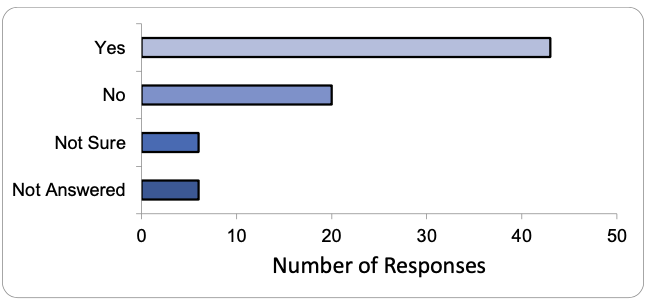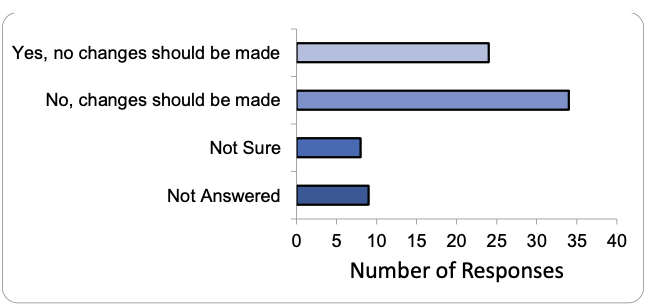Transfer of the functions of Education Appeal Committees to the Scottish Tribunals: consultation analysis
Summary of the analysis of responses submitted during the consultation on whether the functions of Education Appeal Committees (“appeal committees”) should transfer from the auspices of local authorities to the Scottish Tribunals.
3. Analysis of Consultation Responses
3.1 Discussion on approach for quantitative data
The consultation included quantitative questions where the respondent was asked to select an answer from “Yes”, “No”, or “Not Sure”. The number of respondents in each category were counted and are presented in section 3.5. Where respondents did not provide an answer to a question a “no answer” category is also analysed.
3.2 Discussion on approach for qualitative data
A free text box was included alongside the quantitative questions to allow respondents to elaborate on their answer and provide qualitative information about their views on the proposals. Responses which included text as part of the respondents’ answer were analysed as follows.
Responses were initially reviewed to identify themes that presented across the body of responses. Responses were categorised for each question into groups according to the main themes that were present in each response. To ensure consistency across the body of responses, the themes identified were recorded in a coding framework. This document was updated as the analysis progressed. The coding framework recorded themes that arose from the body of responses, and these were further reviewed to identify key themes which encompassed groups of themes. Where a theme is referenced as a key theme, it was identified as a theme raised by over 10 responses to the consultation.
3.3 Limitations of this methodological approach
It is also important to acknowledge that this approach has limitations. Firstly, the coding framework was developed from the themes identified within responses received and was formulated prior to the analysis of responses. Secondly, the questions posed in the consultation document can be argued to have placed boundaries on the responses provided and to have potentially limited their breadth and focus. Finally, it is not possible to guarantee that the analysis will be free of bias. The information provided by respondents will reflect their interests and perspectives. Similarly, the views of those analysing the data will also be present and be reflected in the interpretation of the data and use of the coding framework. However, this approach allows us to identify areas of consensus, disagreement and debate within consultation responses and for them to be explored in greater depth than would be possible with data gathered solely from quantitative questions.
As noted by Cresswell (2013), care should be taken when using a coding framework that attributes numerical values to qualitative data[1]. As a result, we do not set out the number of responses that highlighted the identified theme. We also acknowledge that the analysis is based on information provided by those who responded to the consultation which will not be representative of the wider population and, as noted above, will reflect the views and interests of those individuals and organisations that chose to respond to the consultation.
3.4 Consultation Responses
In total, 75 respondents provided responses for the consultation, 67 through the Citizen Space platform and 8 by email.
| Category of Respondent | Number | Percentage |
|---|---|---|
| Individual | 31 | 41% |
| Organisations representing Local Authority Interests | 29 | 39% |
| Other organisations (representing various stakeholder bodies including those from for example the judiciary and legal profession, advocacy groups for children with additional support needs) | 15 | 20% |
3.5 Quantitative Analysis
This section provides quantitative analysis of the questions in the consultation.
Question 1: do you agree that appeal committees should transfer to the Scottish Tribunals?
69 consultees responded to this question and the majority (68%) were opposed to the proposal:

| Option | Total | Percent |
|---|---|---|
| Yes | 13 | 17% |
| No | 51 | 68% |
| Not Sure | 5 | 7% |
| Not Answered | 6 | 8% |
Question 2: do you consider that appeal committees should remain with local authorities but with improvements to how they operate?
69 responses were given with the majority, 43 (57%) in favour of appeal committees remaining with local authorities. 20 consultees were in favour of appeal committees remaining with local authorities, the remainder were not sure or did not answer:

| Option | Total | Percent |
|---|---|---|
| Yes | 43 | 57% |
| No | 20 | 27% |
| Not Sure | 6 | 8% |
| Not Answered | 6 | 8% |
Question 3: do you consider that no changes should be made to how appeal committees operate?
A total of 66 responses with the largest proportion, 34 (45%), responding that changes should be made to how appeal committees currently operate.

| Option | Total | Percent |
|---|---|---|
| Yes, no changes should be made | 24 | 32% |
| No, changes should be made | 34 | 45% |
| Not Sure | 8 | 11% |
| Not Answered | 9 | 12% |
3.6 Key Findings
A total of 75 responses were received. Responses varied greatly in length. Some responses were brief and gave less explanation of the rationale of their response. Reponses from organisations focussed on the areas of the consultation most relevant to their organisation’s interests and submitted no answers to some of the questions.
Question 1 asked do you agree that appeal committees should transfer to the Scottish Tribunals? Only 17% of respondents (13 responses) believed that appeal committees should transfer to Scottish Tribunals with the majority in favour of retaining the status quo.
Question 2 asked do you consider that appeal committees should remain with local authorities but with improvements to how they operate? The majority (57%) were in favour with 27% of respondents (20 responses) against. However, as noted in section 3.3, whilst some may disagree with the question, this may not necessarily mean they would have a preference in proceeding with the transfer as they may believe that appeal committees remain with local authorities but do not require any improvement.
Question 3 asked do you consider that no changes should be made to how appeal committees operate? Around a third (24) of respondents agreed that no changes should be made to how appeal committees operate and just under half (45%) responded that changes should be made to how they operate.
Contact
Email: jerry.o'connell@gov.scot
There is a problem
Thanks for your feedback